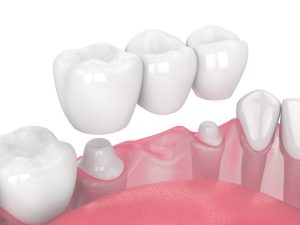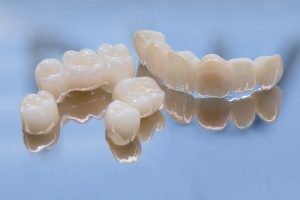Explore the Transformative Power of a Dental Bridge
Dental bridges are an innovative and reliable method for replacing missing teeth using artificial teeth to fill the gaps. These custom-made prosthetics are designed to span either side of the gap, left by one or more absent teeth, enhancing your smile’s aesthetics and improving your overall oral health.
By opting for a dental bridge to replace your missing teeth, you can unlock a multitude of benefits. Let Dr. Matthew Huff, your trusted Kerrville dentist, walk you through the key advantages of replacing missing teeth with a dental bridge below. Then, reach out to Precision Dentistry & Implants of Kerrville, your Kerr County dental practice, at (830) 896-8343 to schedule your personalized dental bridge consultation.
The Top Ten Benefits of Dental Bridges
- Enhanced Oral Functionality: Dental bridges excel at restoring oral function. Missing teeth can hinder your ability to chew efficiently or articulate clearly. A well-crafted dental bridge fills the void, making it easier to enjoy your favorite foods and communicate with confidence. A cantilever dental bridge can restore oral functionality by using a single abutment tooth.
- Aesthetic Enhancement: Gaps in your smile can impact your self-assurance when interacting with others. Dental bridges not only restore functionality but also dramatically improve your smile’s appearance. Dr. Huff designs each bridge to seamlessly blend with your natural teeth, creating a harmonious and attractive smile. A false tooth in a dental bridge can be made from materials like porcelain to match natural teeth.
- Maintains Proper Tooth Alignment: Spaces left by a missing tooth or teeth can cause adjacent remaining teeth to drift, potentially leading to bite issues or misalignment. Dental bridges act as placeholders, keeping your natural teeth in their correct positions and preventing potential orthodontic complications.
- Long-lasting and Resilient: With proper care and maintenance, bridges can be a long-term dental solution. When you follow good oral hygiene practices and attend regular check-ups with Dr. Huff, your dental bridge can serve you well for a decade or more. A temporary bridge can protect abutment teeth while waiting for the permanent bridge.
- Safeguards Remaining Teeth: When teeth are missing, the surrounding teeth bear additional stress and wear. A dental bridge distributes biting forces more evenly, helping to preserve the integrity of your remaining natural teeth.
- Preserves Facial Structure: Tooth loss can lead to facial sagging or premature aging due to jawbone deterioration. Dental bridges help maintain your jaw’s structure, preserving your face’s natural shape and youthful appearance.
- Fixed and User-Friendly: Unlike removable dentures, dental bridges are permanently fixed in place. This means you can care for them just like your natural teeth, eliminating the need for nightly removal and reducing the risk of misplacement.
- Budget-Friendly Option: Compared to some artificial teeth alternatives like dental implants, bridges can be a more economical choice in certain situations, offering both functionality and aesthetic improvement at a more accessible price point. Traditional bridges are often more cost-effective compared to other options.
- Boosts Self-Confidence: Beyond the physical benefits, a complete smile can significantly enhance your self-esteem. By closing the gaps in your teeth, you may feel more self-assured in both social and professional settings.
- Promotes Superior Oral Health: Filling in the gaps between teeth with a dental bridge reduces the risk of food particles becoming trapped, which can lead to decay or gum disease. A full set of teeth encourages better oral hygiene habits, including regular brushing and flossing.
Potential Drawbacks of Dental Bridges
While dental bridges offer numerous benefits, it’s important to be aware of potential drawbacks:
- Impact on Adjacent Teeth: A traditional dental bridge may require the neighboring existing teeth (abutment teeth) to be prepared to support the bridge. This process can potentially weaken these abutment teeth, making them more susceptible to future issues. Implant-supported bridges do not require the preparation of adjacent teeth.
- Hygiene Challenges: The area beneath the dental bridge and abutment teeth requires diligent cleaning to prevent bacterial buildup. Dr. Huff and his team will provide thorough instructions on maintaining optimal oral hygiene.
- Possibility of Bridge Complications: In rare cases, damage to supporting abutment teeth or the dental bridge itself may occur. Regular check-ups with Dr. Huff can help identify and address any issues with your permanent bridge early on.
- Aesthetic Changes: Over time, natural gum recession may create small spaces between the dental bridge and gum line. Dr. Huff can discuss strategies to minimize this effect.
- Finite Lifespan: Even with excellent care, all types of dental bridges have a limited lifespan. Implant-supported dental bridges tend to have a longer lifespan compared to traditional bridges. Dr. Huff will monitor your bridge during regular check-ups and advise when replacement might be necessary.
- Temperature Sensitivity: Some patients may experience increased sensitivity to hot and cold temperatures, especially immediately after the bridge is placed.
- Speech Changes: In some cases, patients may need a short adjustment period to get used to speaking with their new bridge.
- Cost of Replacement: When a bridge needs to be replaced due to wear or damage, the cost can be significant, especially if multiple units are involved.
- Difficulty in Flossing: Flossing around and under a permanently cemented dental bridge can be more challenging than with natural teeth, potentially leading to inadequate cleaning in these areas.
- Bone Loss: Unlike dental implants, traditional bridges do not stimulate the jawbone, which can lead to bone loss in the area of the missing tooth over time. Implant-supported bridges can help prevent bone loss.
- Limited Suitability for Back Teeth: A dental bridge may not be as suitable for replacing molars or other back teeth that endure too much force during chewing. In such cases, dental implants might be a more appropriate option.
Frequently Asked Questions
While dental bridges are an excellent solution for many patients with missing teeth, they may not be suitable for everyone. Your dentist will assess your oral health, jawbone condition natural tooth amount, the condition of nearby teeth, and overall dental structure to determine if bridges are the best option for you. In some cases, they might recommend alternatives such as dental implants or partial dentures.
The success of the dental bridge procedure depends on a healthy foundation, including healthy gums and adjacent teeth. If you have gum disease or other dental issues, your dentist will work with you to address and resolve these concerns before proceeding with a dental bridge. They’ll thoroughly evaluate your oral health to create a personalized treatment plan.





